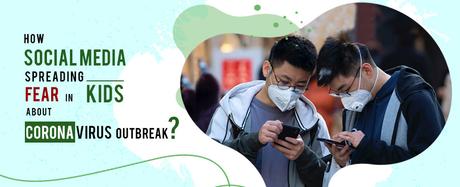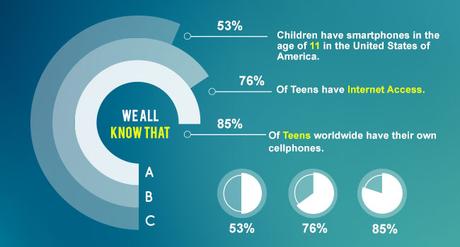
Schools worldwide, traveling on air busses, railway stations, and even traveling on the local busses have been banned.
On the other hand, digital devices likewise phones, tablets, computers, and the internet are the ways to communicate with friends and other family members to keep them on board.
However, the social media comment sections using digital devices have become ground zero to intense arguments over such preparations are justified.
So, digital social platforms using digital phones are shaping the kid's minds.
There is fear growing continuously on Facebook in particular.
Young kids and teens get access to their news feeds and see plenty of videos and posts regarding the reason behind school closures.
It is certainly a nightmare for the young generation who has access to their cellphones connected to cyberspace. Therefore, we can say that social media platforms are spreading fear in children due to the COVID-19 outbreak.
Facebook &Twitter spreading sensationalism & misinformation about coronavirus
Conversations and news feed on Facebook and twitters offering a window for our response about COVID-19.
However, the collective responses of social media users shaping young kids' and teen's minds who love to stay online on social apps and websites.
As coronavirus starts spreading in the United States and more than 80 countries of the world Facebook, Twitter and other platforms start updating information about the pandemic.
However, all of these social websites were not active during past major outbreaks. There is no doubt, social websites online are facilitating worthy enough information, but at the same time spreading sensationalism and disinformation.
The contemporary phones, social networking platforms, and internet facilities provide us valuable information, but also make kids anxious and scared of what is coming.
Social media could help us out when we are in a state of isolation from one another. Moreover, conversations, particularly on community-level on social networking platforms about coronavirus, enable us to navigate the crisis, Jeff Hancock, Stanford University Professor and the director of Stanford social Media Lab said that.
The health experts and even the scientists these days willingly get engage with the general public to show recent and accurate information.
However, still, there are thousands of community leaders and community users spreading speculations and disinformation on the digital world.
So, the disinformation pulls out everyone's mind including children obsessed with the cellphones and internet, Daniel Rogers an Assistant Professor at New York University stated that.
Therefore, Parents have to know what sort of content they are accessing on their social networking websites.
Furthermore, parents should guide their children during school closures what they should do on social media.
Moreover, parents should keep an eye on their online activities especially on the social digital world in particular.
So, there is a dire need to make your kids positive during the COVID-19 outbreak.
Let's get to know how parents can make their children positive no matter what if they are accessing sensational and misinformed information on online media platforms.
Social media-obsessed kids are at greater risk of Coronavirus Fear
We all know that more than half 53% of children have smartphones in The United States of America.
kids own cellphone from the age of 11. Moreover, 85% of teens worldwide own cellphones and out of all 76% of teens have internet access.
Teens and children who are highly addicted to social networking websites can produce scary feelings and may go into a deep depression due to chaos and disinformation of coronavirus.

On the other hand, school closures are the reason behind cellphone addicts are more likely to stay online on Facebook and Twitter no time ever before.
So, they can become the victim of sensationalism and disinformation floating on the web and social sites.
There is no doubt that the new COVID-19 is deadliest, but the rumors and speculations are on the rise.
Parents should know about the new coronavirus and they should guide their children on how to remain safe likewise they can wear the mask, wash their hands back and forth and stay at distance from the crowd.
On the other hand, kids have to remain in their house and they have nothing left but to use social media on their cell phones and computer devices.
So, already social networking addicts have started most of the time on their phones connected to cyberspace.
Furthermore, they are scared of the deadliest disease because they do believe in the rumors published or posted on Facebook and Twitter. Therefore, we can say that kids who are more likely to spend time in the digital world are at greater risk of coronavirus fear.
Experts say that social media usually promote such content that is based on sensationalism and misinformation. However, emotionally charged content always catches people's eyeball no matter what.
Therefore, parents should keep an eye on kids' and teen's online activities especially when they are using a website like Facebook, Twitter and plenty of others where information is floating about COV-19.
Since the virus has become pandemic, parents themselves are reportedly telling their children to spend their time on digital devices on social platforms online.
Parents should set aside with the children to see what they are doing on their smartphones and they should guide their children about the disease.
This will help them out to boost the morale of the teens. If, parents have to go outside for work they can use parental control app on their cellphone or GPS tracker to see teen's online activities and their current location.
Can Parents make kid's positive in coronavirus world
Millions of people worldwide are going to enter the state of isolation after the outbreak of Coronavirus including children. Therefore, the need for positivity particularly among kids has become crucial.
An adult can understand the dos and don'ts but when it comes to young innocent souls they become scared. All the scary feelings are coming from the web or due to excessive use of social media.
Taking the viewpoint of Mike Buchanan, residing in the University of Pennsylvania on Positive Psychology, we can advocate the following techniques to make kid's think positive in the world of COVID-19.
When it comes to focusing on positive emotions, it does not mean that a person should smile only. It means you should see a bad situation from a constructive perspective.
Moreover, you should guide your children on how to have an optimistic approach.
On the other hand, COVID-19 has made the optimism a real challenge.
Let's get to know how parents can bring positivity in children even in this pandemic.
Bring positive emotions in kids
All you need to do is to limit your kid's access to digital social websites and news feeds.
Parents can set parental control on kid's digital devices to monitor or limit their screen-time and activities.
Don't let your child to constantly bombarded with the rumors and fake news about coronavirus on social media and as well as on mainstream media.
Parents can remotely block the social apps, websites and web browser websites with mobile parental monitoring apps.
Let kids engaged on the cellphone with friends for a while
Isolation is on the rise among people very after COVID-19 and getting engaged with friends in real-life has become impossible for children.
Your kids want to interact with their friends and other family members living on another side of the town.
Use the digital phone, internet, and social world online and let them talk to friends for a while on phone calls and social media messages.
However, sit aside with the children and keep looking at their activities.
Teens in relationship
Relationships are necessary for everyone and if your teens having an intimate relationship with someone. It is the time to stay at home and to interact with your loved ones; isolation does not mean your relationship starts suffering.
However, parents should have a watchful eye on your children to know the nature of the relationship.
Furthermore, parents should keep an eye in neighborhoods to know if someone is suffering from a week's internet connection and computer devices. If someone in your surround is not infected you can do conversations keep a distance.
Conclusion: Get tech Help
We have discussed earlier in the topic that social media is continuously shaping our young generation's opinion and there is growing fear due to rumors and disinformation spreading on social platforms.
Facebook and Twitter, in particular, are unable to mitigate the sharing of every kind of information about COVID-19.
Sensational news stories and speculations regarding coronavirus lethality are prevailing fear among children.
Apart from other precautions, parents can use social media monitoring software to keep a hidden eye on children's activities online.
Furthermore, somehow if you have to go outside for meal and stuff behind you can track kid's location 24/7 and get alerts if they have left the house for sure.
